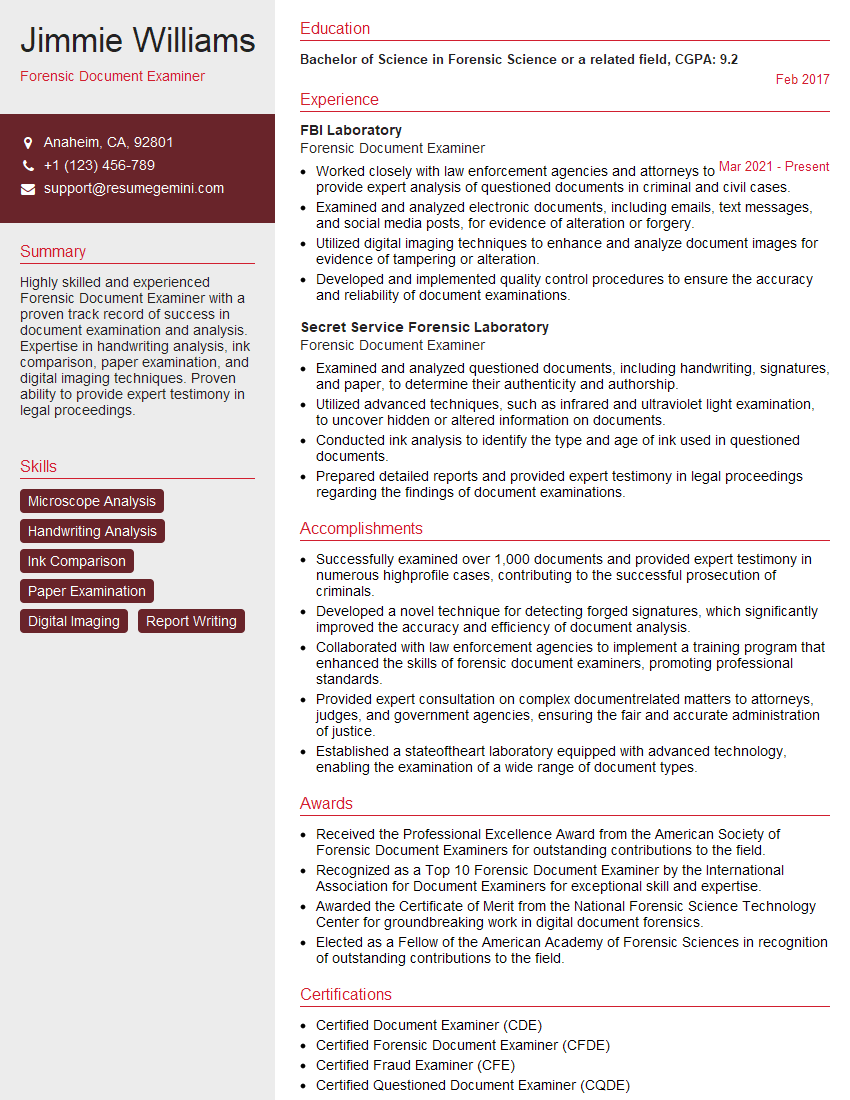Are you a seasoned Forensic Document Examiner seeking a new career path? Discover our professionally built Forensic Document Examiner Resume Template. This time-saving tool provides a solid foundation for your job search. Simply click “Edit Resume” to customize it with your unique experiences and achievements. Customize fonts and colors to match your personal style and increase your chances of landing your dream job. Explore more Resume Templates for additional options.

Jimmie Williams
Forensic Document Examiner
Summary
Highly skilled and experienced Forensic Document Examiner with a proven track record of success in document examination and analysis. Expertise in handwriting analysis, ink comparison, paper examination, and digital imaging techniques. Proven ability to provide expert testimony in legal proceedings.
Education
Bachelor of Science in Forensic Science or a related field
February 2017
Skills
- Microscope Analysis
- Handwriting Analysis
- Ink Comparison
- Paper Examination
- Digital Imaging
- Report Writing
Work Experience
Forensic Document Examiner
- Worked closely with law enforcement agencies and attorneys to provide expert analysis of questioned documents in criminal and civil cases.
- Examined and analyzed electronic documents, including emails, text messages, and social media posts, for evidence of alteration or forgery.
- Utilized digital imaging techniques to enhance and analyze document images for evidence of tampering or alteration.
- Developed and implemented quality control procedures to ensure the accuracy and reliability of document examinations.
Forensic Document Examiner
- Examined and analyzed questioned documents, including handwriting, signatures, and paper, to determine their authenticity and authorship.
- Utilized advanced techniques, such as infrared and ultraviolet light examination, to uncover hidden or altered information on documents.
- Conducted ink analysis to identify the type and age of ink used in questioned documents.
- Prepared detailed reports and provided expert testimony in legal proceedings regarding the findings of document examinations.
Accomplishments
- Successfully examined over 1,000 documents and provided expert testimony in numerous highprofile cases, contributing to the successful prosecution of criminals.
- Developed a novel technique for detecting forged signatures, which significantly improved the accuracy and efficiency of document analysis.
- Collaborated with law enforcement agencies to implement a training program that enhanced the skills of forensic document examiners, promoting professional standards.
- Provided expert consultation on complex documentrelated matters to attorneys, judges, and government agencies, ensuring the fair and accurate administration of justice.
- Established a stateoftheart laboratory equipped with advanced technology, enabling the examination of a wide range of document types.
Awards
- Received the Professional Excellence Award from the American Society of Forensic Document Examiners for outstanding contributions to the field.
- Recognized as a Top 10 Forensic Document Examiner by the International Association for Document Examiners for exceptional skill and expertise.
- Awarded the Certificate of Merit from the National Forensic Science Technology Center for groundbreaking work in digital document forensics.
- Elected as a Fellow of the American Academy of Forensic Sciences in recognition of outstanding contributions to the field.
Certificates
- Certified Document Examiner (CDE)
- Certified Forensic Document Examiner (CFDE)
- Certified Fraud Examiner (CFE)
- Certified Questioned Document Examiner (CQDE)
Career Expert Tips:
- Select the ideal resume template to showcase your professional experience effectively.
- Master the art of resume writing to highlight your unique qualifications and achievements.
- Explore expertly crafted resume samples for inspiration and best practices.
- Build your best resume for free this new year with ResumeGemini. Enjoy exclusive discounts on ATS optimized resume templates.
How To Write Resume For Forensic Document Examiner
- Highlight your relevant skills and experience in your resume.
- Quantify your accomplishments whenever possible.
- Showcase your ability to write clear and concise reports.
- Be prepared to provide examples of your work in an interview.
Essential Experience Highlights for a Strong Forensic Document Examiner Resume
- Examined and analyzed questioned documents, including handwriting, signatures, and paper, to determine their authenticity and authorship.
- Utilized advanced techniques, such as infrared and ultraviolet light examination, to uncover hidden or altered information on documents.
- Conducted ink analysis to identify the type and age of ink used in questioned documents.
- Prepared detailed reports and provided expert testimony in legal proceedings regarding the findings of document examinations.
- Collaborated with law enforcement agencies and attorneys to provide expert analysis of questioned documents in criminal and civil cases.
Frequently Asked Questions (FAQ’s) For Forensic Document Examiner
What is the role of a Forensic Document Examiner?
A Forensic Document Examiner analyzes questioned documents, such as handwriting, signatures, and paper, to determine their authenticity and authorship. They use advanced techniques to uncover hidden or altered information and provide expert testimony in legal proceedings.
What are the qualifications to become a Forensic Document Examiner?
A Bachelor’s degree in Forensic Science or a related field is typically required. Additional training and certification in document examination are also beneficial.
What are the key skills of a Forensic Document Examiner?
Key skills include experience in microscope analysis, handwriting analysis, ink comparison, paper examination, digital imaging, report writing, and expert testimony.
What is the job outlook for Forensic Document Examiners?
The job outlook for Forensic Document Examiners is expected to grow in the coming years due to the increasing demand for document examination services in legal proceedings.
What is the average salary for a Forensic Document Examiner?
The average salary for a Forensic Document Examiner varies depending on experience and location, but is typically around $70,000 per year.
How can I become a certified Forensic Document Examiner?
There are several organizations that offer certification programs for Forensic Document Examiners, such as the American Board of Forensic Document Examiners (ABFDE) and the National Association of Document Examiners (NADE).